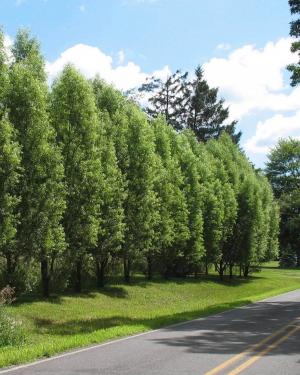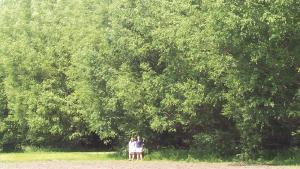2023 - Volume #BFS, Issue #23, Page #41
[ Sample Stories From This Issue | List of All Stories In This Issue | Print this story
| Read this issue]
Hybrid SuperTree Great For Windbreaks
 |
 |
Karsten Nursery has been in the tree business for over 4 decades. The nursery first specialized in standard bare-root windbreak trees like honeysuckles, green ash, and viburnum, but realized it had something special after propagating their hybrid willow.
“We planted 600 SuperTrees around our nursery and spent 5 years observing them before we decided they were something we wanted to sell,” says Joel Karsten. “Now, 30 years after that first planting, we have seen the tree’s entire life cycle, and we are very excited about how it has performed.”
The Hybrid SuperTree stands out from other windbreak species due to its growing speed and strength. Both traits mean they can act as a windbreak within 3 years of planting. Says Karsten, “In some parts of the country, these trees will grow 10 to 14 ft. per year, but in our shorter growing season here in Minnesota, we see 6 to 8 ft. per year.”
Most quick-growing trees, like poplars, are weak and tend to drop branches, which litters fields and creates a mess on the ground. In contrast, the SuperTree isn’t subject to weak branches and broken limbs in the same way.
Says Karsten, “Last summer when the Derecho storm went through Iowa, we were pleased to hear from many of our customers down there that the SuperTrees survived the storm very well. Even when other trees were completely shredded, the SuperTrees just bent over and popped back up. We sold more of them to farmers in that part of Iowa this past spring than ever before.”
As a hybrid, the SuperTree won’t produce seeds or grow suckers from the roots. It’s a non-invasive grower that won’t take over wetlands or uncultivated areas like other willows can. And the tree’s denser wood makes for fair firewood.
While Karsten Nursery still sells over 100 other tree species, the Hybrid SuperTree consistently outsells the rest, and demand increases each year. SuperTrees are available for purchase starting at $7 each in quantities of 10 up to $5 each for 1,000 or more. Shipping is additional.
Contact: FARM SHOW Followup, Karsten Nursery, 1313 Willow Circle, Roseville, Minn. 55113 (ph 651-470-2096; joel@karstennursery.com; www.karstennursery.com).
Deciduous trees and shrubs include varieties of almond, apricot, arrowwood, ash, birch, buckeye, buffaloberry, butternut, caragana, cherry, chokeberry, cotoneaster, cottonwood, crabapple, cranberrybush, currant, dogwood, elderberry, elm, hawthorn, hazelnut, hickory, honeylocust, honeysuckle, false indigo, lilac, linden, maple, nannyberry, common ninebark, oak, olive, pear, plum, poplar, rose, sumac, and walnut, willow.
Bareroot conifers include varieties of cedar, fir, pine, spruce, and tamarack. Call for current availability.

Click here to download page story appeared in.

Click here to read entire issue
To read the rest of this story, download this issue below or click here to register with your account number.




